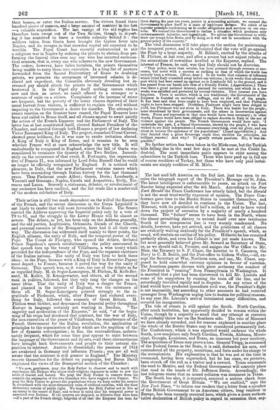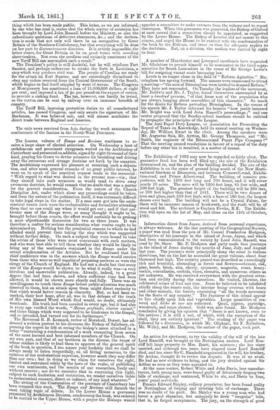The last mail left America on the 2nd inst. just
too soon to re- ceive the telegraph report of the President's Message v a St. John. The latest intelligence is unfavourable to peace, an attack on Fort Sumter being expected after the 4th March. According to the New Pork Herald the Peace Conference has utterly failed, but the Herald is not the most trustworthy exponent of opinion. The Peace Con- ference gave time to the Border States to consider themselves, and they have now all decided to continue in the Union. The last, Missouri, with its population of half a million, is said to have voted down the project of secession by a majority of nearly a hundred thousand. The "failure" seems to have been in the North, where the clause permitting slavery to extend itself over new territories South of the compromise line is very warmly condemned. No details, however, have yet arrived, and the politicians of all classes are evidently waiting anxiously for the President's speech, which, as usual, will contain an outline of his policy. Hitherto he has remained perfectly silent, and even his Cabinet is not yet made known. The list most generally believed gives Mr. Seward as Secretary of State, or, as we should call it, Premier, and assigns the War Office to Mr. Blair, the Treasury to S. P. Chase, the Interior to S. Cameron, the Navy to C. B. Smith, and the Post-office to Gideon Welles,—all, ex- cept the Secretary at War, Northern men, and one, Mr. Chase, sup-. posed to hold somewhat extreme opinions in favour of coercion. The American.papers discuss with great acrimony the conduct of the President in running" from Pennsylvania to Washington. It is asserted that a plot had been discovered to kill Mr. Lincoln and some of his supporters by running the train off the line, and he accordingly travelled rapidly and in disguise. As any crime of the kind would have produced immediate civil war, the President's flight is not impossible, but according. to other accounts he had received messages from Washington urging him to hasten for political reasons. In any case Mr. Lincoln's arrival terminated many difficulties, and secured his inauguration. The tide of events is still against the South. North Carolina, after much hesitation, has apparently decided to remain within the Union, though by a majority so small that any attempt at coercion will probably throw her on the Southern side. The vote of Missouri we have already recorded, and for reasons explained in another place the whole of the Border States may be considered permanently lost, The Confederacy,. which it was expected would embrace the whole South, now compnses only South Carolina, Florida, Alabama, Missis- sippi, Georgia, Louisiana, and Texas, an immense but poor territory.. The acquisition of Texas may prove a loss. General Twigg, in command of the Federal forces in the State, it is said, disbanded his men, and surrendered all the property, munitions, and forts under his charge to the secessionists. His explanation is that he was not at the time in command, having been superseded, but he has since, we perceive, been struck off the roll as a traitor and a coward. Texas commands the road to Mexico, and the Federal Government will scarcely place that road in the hands of Mr. Jefferson Davis. Accordingly, the last telegram states that an armed collision was imminent in Texas. The South has also, it is reported, received a serious check from the Government of Great Britain. "We are enabled," says the New Pork Times," to inform our readers that a letter from a member of the British Government to an American citizen, long resident in Europe, has been recently received here, which gives a more authori- tative declaration of British policy in. regard to secession than any-
thing which has been made public. This letter, as we are informed, by one who has read it, states that the whole matter of secession has been brought by Lord John Russell before the Ministry, as also the subordinate questions of defective clearances, &e. ; and the declara- tion is made that not only will there be no recognition by Great Britain of the Southern Confederacy, but that everything will be done on her part to discountenance disunion. It is utterly impossible, the letter states, for Great Britain to be on good terms with seceding slave-traders. Not even the needless and untimely enactment of the new Tariff Bill can accomplish such a result." The President's policy is still doubtful, but he will reinforce Fort Sumter, and perhaps endeavour to retake the forts in Louisiana, a step which may produce civil war. The people of Carolina are ready for the attack on Fort Sumter, and are exceedingly disinclined to obey any orders received from the Central Government of the South, which begins to find itself crippled by want of means. The Congress at Montgomery has sanctioned a loan of 15,000,000 dollars, at eight per cent., and imposed a tax of ie. per pound on the export of cotton. to provide a sinking fund. The tax, however, can hardly be levied, as the cotton can be sent by railway over an immense breadth of country. The Tariff Bill, imposing protective duties on all manufactured articles, has passed Congress, and only awaits the signature of Mr. Buchanan. It was believed safe, and will almost annihilate the direct trade between England and America.































 Previous page
Previous page